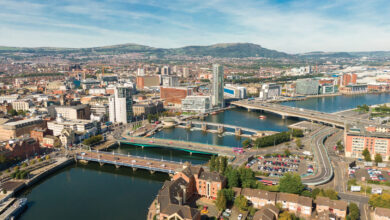A follow up to the 2006 skills strategy, Success through Skills 2 prepares for a future where 90 per cent of jobs will require formal qualifications and a highly skilled workforce.
This revised draft strategy, put out to public consultation by Reg Empey on 1 June, centres on the fact that the 2008 Programme for Government’s main goal was to create an “innovative and dynamic” economy. In order to achieve this, Success through Skills 2 aims to increase the number of well qualified managers in the province, up-skill the current workforce and ensure that the future workforce has a higher level of skills.
This vision will be realised, according to the strategy, in four ways:
• focusing on graduates and those entering the labour force for the first time;
• providing qualifications and training for the existing workforce;
• ensuring the unemployed are provided with the skills to compete for jobs; and
• if there are not enough people with high level skills to meet an employers’ needs, more skilled people from other countries should be encouraged to consider Northern Ireland as a place to work and live.
An initial skills strategy was implemented in 2006 but because of the economic downturn and the programme, the priorities have changed. Businesses must adapt to meet the needs of the recession whilst preparing their workforce for an eventual upturn. The revised strategy examines the skills needed to grow the Northern Ireland economy in the future and highlights areas for action. Following the consultation an implementation plan will outline the specific actions that must be taken and how much they will cost.
A definition of ‘skills’ falls into three categories: the ‘essential skills’ of literacy, numeracy and ICT; the ‘employability skills’ of team working, problem solving and flexibility; and the ‘work-based skills’ that are established in the National Qualifications Framework (NQF).
Prior to formulating this strategy, DEL, DETI and DFP commissioned Oxford Economics to produce a report outlining the skills challenges that the province will need to address before 2020. As we approach that date, there will be an increasing need for people with skills at levels four to eight on the qualifications framework. More employers, operating in an “increasingly skills hungry” job market, will look for maths, computer science, engineering, technology, law and design degrees, and there will be less demand for medicine and education degrees.
In addition, because over 75 per cent of those who will make up the workforce in 10 years time have already completed their compulsory school education, there must be a renewed focus on up-skilling them through training and further qualifications. Northern Ireland must offer attractive lifestyle and employment opportunities in order to attract skilled people to the region. The unemployed or those on a government training programme should also be able to complete a qualification.
The Oxford Economics report outlined that the region’s four strategic skills goals for 2020 must be to:
• increase people in employment with NQF level 2 skills and above from a baseline of 71.2 per cent to 84-90 per cent;
• increase people in employment with NQF level 3 skills and above from a baseline of 55.6 per cent to 68-76 per cent;
• increase people in employment with NQF level 4 to 8 skills and above from 33.2 per cent to 44-52 per cent; and
• increase the numbers qualifying from higher education institutions with graduate and post-graduate level courses in science, technology, economics and maths (STEM) subjects by 25 to 30 per cent.
As well as encouraging people to achieve higher level skills and up-skilling the workforce, the economic scenario predicted for 2020 requires more management and leadership skills, an increased number of people with STEM qualifications entering the workforce, and more in-migration of skilled labour.
In order to better understand the demand for skills, labour market information must be used more effectively by employers, the unemployed, job changers, school leavers and careers advisers. This will entail labour market information on each of the strategic targets in the Public Service Agreements being updated regularly and published on the department’s website.
The quality and relevance of education and training will be improved by reforming vocational qualifications through the establishment of the Qualifications and Credit Framework. In addition, DEL and Invest NI will pilot a model from North Carolina whereby provision of a skilled workforce, tailored to the specific needs of companies, will be assured by further and higher education institutions.
In order to increase the skills level of the workforce, individual learner programmes, including essential skills, will be introduced for all 16 to 19 year olds to ensure that every pupil entering a further education college is provided with a personalised programme of learning that will enable them to go in the right direction to meet their career aspirations. The Apprenticeships NI programme will continue to be promoted as DEL’s main provider of professional and technical training in the workplace. In addition there will be renewed focus on providing first time qualifications as well as management and leadership training for employees in small and medium sized enterprises (SMEs).
The department will continue its Essential Skills, Bridge to Employment and Pathways to Work programmes to ensure that “skills barriers” to employment are removed.
This draft strategy calls for a commitment from stakeholders to “place the relevant actions that will be included in the forthcoming implementation plan at the forefront of their own business activity.”
It states: “Ultimately only companies themselves can achieve and sustain competitive advantage through innovation, whether this is in the development of new products, using new technologies or by utilising human resources and skills in a more productive manner.
“However, whilst Government itself cannot create business competitiveness, it can ensure that the infrastructure is in place to train people with the skills necessary to facilitate this innovation.”
The Department of Education is called upon to “deliver skills targets through the flow of young people into the workforce” and DETI must ascertain the future demand for skills through economic forecasting, whilst taking into account the potential growth of new foreign and direct investment. Sector skills councils will have to set out Northern Ireland action plans outlining ‘priority qualifications’ that show what level of qualification is needed for particular occupational areas. They must also approve qualifications that are ‘fit for purpose’ and meet employer needs.
Preparations for and the implementation of many of the above projects got underway after the previous skills strategy was implemented in 2006.
Announcing the consultation period Reg Empey said: “The jobs in our labour market are changing. They rely more and more on people’s knowledge and how they can ‘add value’. It is forecast that by 2020, as few as 10 per cent of jobs will require no formal qualifications and as many as 52 per cent will require qualifications at level 4 and above.”
The consultation closes on 17 September and the Assembly’s Employment and Learning Committee will also be considering the strategy in detail.







